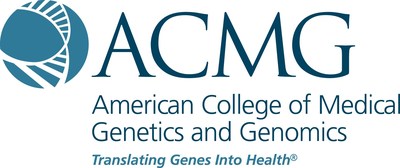The American College of Medical Genetics and Genomics (ACMG) has released its first Evidence-based Clinical Practice Guideline (EBG), " Exome and genome sequencing for pediatric patients with congenital anomalies or intellectual disability: an evidence-based clinical guideline of the American College of Medical Genetics and Genomics.
|
BETHESDA, Md., July 1, 2021 /PRNewswire/ -- The American College of Medical Genetics and Genomics (ACMG) has released its first Evidence-based Clinical Practice Guideline (EBG), "Exome and genome sequencing for pediatric patients with congenital anomalies or intellectual disability: an evidence-based clinical guideline of the American College of Medical Genetics and Genomics." The EBG was published in ACMG's official journal, Genetics in Medicine. Based on a Systematic Evidence Review, the Guideline makes a strong recommendation to support the use of Exome/Genome Sequencing (ES/GS) as either a first- (or second-) line test in patients with CA/DD/ID. ES/GS demonstrates clinical utility for patients and their families with limited evidence for negative outcomes and the ever-increasing emerging evidence of therapeutic benefit. The authors also hope that the framework used helps accelerate the process for the consideration of other test modalities in the future. "We are excited to announce the publication of the first ACMG-endorsed evidence-based guideline on the use of exome and genome sequencing for evaluation of pediatric intellectual disability or multiple congenital anomalies," said Fuki Marie Hisama, MD, FACMG, FAAN and Murugu Manickam, MD, FACMG, who co-chaired the ACMG EBG working group. "Our committee included 10 experts in clinical genetics, neurogenetics, genetic counseling, a parent and advocate and methodologists. We expect this EBG will help to raise the quality and consistency of health care and improve outcomes for patients with rare genetic disorders." Congenital Anomalies (CA), Developmental Delay (DD), and Intellectual Disability (ID) are among the most common indications for pediatric genetic referrals and comprise potentially thousands of conditions that can impact a child's physical, learning or behavioral function. In contrast to early childhood mortality, which declined by 50% from 1990 to 2016, the prevalence of developmental disabilities was unchanged over the same period, according to the Global Burden of Diseases, Injuries and Risk Factors Study. Congenital anomalies are structural or functional abnormalities usually evident at birth, or shortly thereafter, and can be consequential to an individual's life expectancy, health status, and physical or social functioning, and typically require medical intervention. Identification of an underlying diagnosis for CA/DD/ID can lead to changes in care management that will influence mortality and morbidity and can reduce the burden on patients and families searching for answers. Creating guidelines will also provide clinicians with justification for ordering these tests and stresses the importance of pre- and post-test counseling about these results. Countless papers have been published on this general topic, but most are case reports or limited case series emphasizing the rarity of many of these conditions. The ACMG Systematic Evidence Review (SER) looked for larger series to be able to gather as many cases with outcomes as possible, and not just case reports. The Pediatric Exome/Genome Sequencing Evidence-Based Guideline Work Group used the Grading of Recommendations Assessment, Development and Evaluation (GRADE) evidence to decision framework based on the recent ACMG SER, and an Ontario Health Technology Assessment to develop and present evidence summaries and health care recommendations. The document underwent extensive internal and external peer review, and public comment, before approval by the ACMG Board of Directors. "The publication of this guideline is a landmark achievement for the ACMG," said Marc S. Williams, FACMG and president of ACMG. "It is the culmination of years of foundational work and a commitment to implementing the best practices for the development of evidence-based guidelines. The process is very resource intensive and could not have been accomplished without the support of dedicated funding provided through the ACMG Foundation. We look forward to many more evidence-based guidelines in the years to come," he concluded. About the American College of Medical Genetics and Genomics (ACMG) and ACMG Foundation Founded in 1991, the American College of Medical Genetics and Genomics (ACMG) is the only nationally recognized medical professional organization solely dedicated to improving health through the practice of medical genetics and genomics, and the only medical specialty society in the U.S. that represents the full spectrum of medical genetics disciplines in a single organization. The ACMG is the largest membership organization specifically for medical geneticists, providing education, resources and a voice for more than 2,500 clinical and laboratory geneticists, genetic counselors and other healthcare professionals, nearly 80% of whom are board certified in the medical genetics specialties. ACMG's mission is to improve health through the clinical and laboratory practice of medical genetics as well as through advocacy, education and clinical research, and to guide the safe and effective integration of genetics and genomics into all of medicine and healthcare, resulting in improved personal and public health. Four overarching strategies guide ACMG's work: 1) to reinforce and expand ACMG's position as the leader and prominent authority in the field of medical genetics and genomics, including clinical research, while educating the medical community on the significant role that genetics and genomics will continue to play in understanding, preventing, treating and curing disease; 2) to secure and expand the professional workforce for medical genetics and genomics; 3) to advocate for the specialty; and 4) to provide best-in-class education to members and nonmembers. Genetics in Medicine, published monthly, is the official ACMG journal. ACMG's website, www.acmg.net, offers resources including policy statements, practice guidelines, educational programs and a 'Find a Genetic Service' tool. The educational and public health programs of the ACMG are dependent upon charitable gifts from corporations, foundations and individuals through the ACMG Foundation for Genetic and Genomic Medicine. Kathy Moran, MBA
SOURCE American College of Medical Genetics and Genomics |





